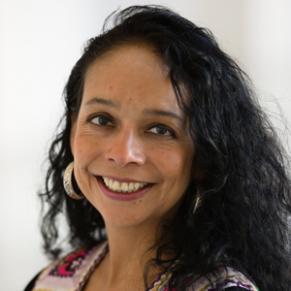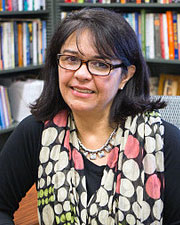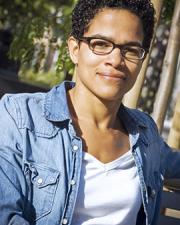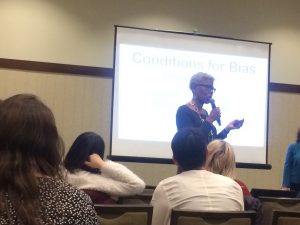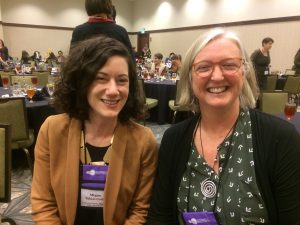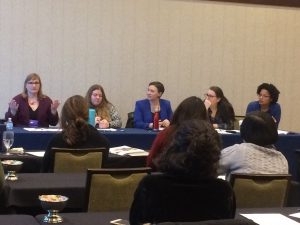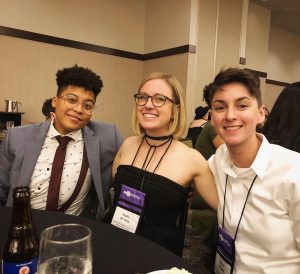To add to an already incredible year of funding acceptances for the department, four UT Austin sociology graduate students have received dissertation awards from the National Science Foundation (NSF). Below is some information about their research, as well as their advice for future applicants.

Dissertation: “Breaking the Grass Ceiling: Gender, Race, and Class in the U.S. Legal Cannabis Industry”
Advisor: Christine Williams
Year in the program: 4
This project investigates how the emerging multibillion-dollar U.S. legal cannabis industry is stratified by race and gender. Employing the techniques of ethnographic assemblage (Collins 2017), this multi-method study uses content analysis, in-depth interviews, and field research in dispensaries to explore stratification in the emerging industry. This research will have theoretical implications for studies of gender, race, drug economies, and labor inequality, and contribute to policy debates around these issues.
What is some advice you would give students who are applying to NSF in the future?
My two pieces of advice are to get started early, so you have ample opportunity to revise the proposal, and to begin by reading successful proposals from past years, if you can. The NSF wants a particular style and framing and it helps to see examples.

Dissertation: “The Police Force: Gender, Race, and Use of Force Training in Police Academies”
Advisor: Christine Williams
Year in the program: 5
If you ask police officers why they chose a career in law enforcement, most will tell you that they wanted to help people and serve their community. These honorable motivations stand in stark contrast to the patterns of racially-biased and excessive force that have given rise to protest movements across the country. In this project, we examine police training to discern how high-minded ideals are transformed into the excessive use of force. At the academy, cadets are exposed to the institutional ideologies, practices, and embodiments of U.S. law enforcement, including when, how, and on whom they can or should use force, and thus, the academy is a key site of study to better understand why racially-biased and excessive force persists. In this study, I address three questions: (1) How do police departments decide who to hire? (2) How are police officers trained to use force? (3) What do the recruitment strategies and training practices reveal about how police departments conceptualize gender, race, and violence? I turn the focus away from explanations of police violence that point to officers’ individual racial biases, the purported necessity of using force in high-crime areas, or inadequate de-escalation training, to instead examine how the ways in which police departments choose applicants and train cadets may play a role in the use of excessive force. By focusing on training, this study will help scholars, policy makers, and police departments better understand how previous reform efforts – for example, increasing the racial and gender diversity of the police force, implementing de-escalation training, or requiring body cameras – may be ineffective, and will provide important insights into developing new approaches to training recruits.
What is some advice you would give students who are applying to NSF in the future?
I would definitely advise that anyone applying to NSF read as many past proposals as possible. Reviewing colleagues’ proposals gives great insight into how to structure the document, what kind of language to use, and how to frame the project.
Dissertation: “The Racialized and Gendered Governance of the Poor in Low Level Misdemeanor Courts”
Advisor: Becky Pettit
Year in the program: 4
There are about ten million misdemeanor cases every year in the United States, almost five times the amount of felony cases. Focusing on misdemeanor courts gives insight as to how the criminal justice system regulates and manages millions of people. This view goes against the dominant narrative that punishment has abandoned its productive functions and simply locks people away and warehouses them. Misdemeanor courtroom interactions suggest that courts regulate those that walk through its doors. Meanwhile, stringent court requirements and norms paradoxically make the fulfillment of court-mandated requirements more difficult sometimes even impossible. How do we reconcile such contradictory demands? Drawing on ethnographic methods, including participant observation of 15 misdemeanor courtrooms around Texas and interviews with misdemeanor court defendants, prosecutors, defense attorneys and judges, this project explores the ways in which misdemeanor courts actors and practices manage and regulate marginalized populations and how these populations react and resist to this regulation.
What is some advice you would give students who are applying to NSF in the future?
Read examples of winning submissions, don’t start from scratch! Use the resources in the department and the PRC [Population Research Center] that help with the process. Have colleagues and faculty read and give feedback before you submit.

Dissertation: “Interagency Collaboration, Child Welfare Involvement, and its Consequences for Children and Families”
Advisors: Rob Crosnoe and Shannon Cavanagh
Year in the program: 4
The majority of child maltreatment reports received by child protective service agencies in the United States come from professionals such as teachers, healthcare providers, and social workers. Informal and formal data sharing between the child welfare system and other institutions thus facilitates the investigation of and intervention in cases of child maltreatment. One consequence of this collaboration, however, is that families may avoid institutions that provide necessary resources out of fear of coming into contact with the child welfare system. My research analyzes under what circumstances institutional engagement is associated with a greater likelihood of child protective services involvement, as well as how child protective services involvement is related to future institutional engagement. Exploring how interactions with the child welfare system constrain families’ willingness to access needed services sheds light on one understudied mechanism in the reproduction of social stratification. In addition, this project will generate practical suggestions for encouraging greater service uptake and collaboration between social service workers and clients.
What is some advice you would give students who are applying to NSF in the future?
The application itself looks really intimidating with all of the bureaucratic mumbo-jumbo. Don’t be afraid to ask for help with this part! Faculty and other staff who regularly deal with grants can help make this part much easier. Your most important job is to concentrate on describing the actual research.
___________________________________________________________________________
Applications for for the Doctoral Dissertation Research Improvement Awards for sociology are due in October and are awarded based on four criteria:
(1) the theoretical grounding of the research
(2) the ability for the research to be empirically observed or validated
(3) the appropriateness of the research design to the questions asked
(4) the ability for the research to advance understanding of social processes, structures, and methods
Here’s to hoping for an equally successful round next year!

